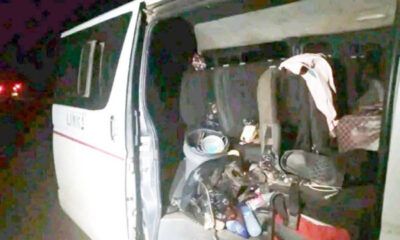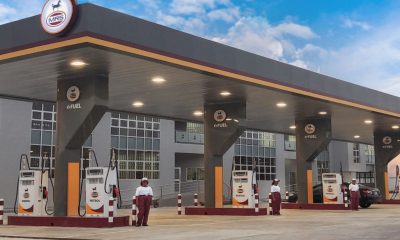Business
Regulator vows to sanction petrol marketers breaching official prices, shuts down 7 defaulting depots

The Nigerian Midstream and Downstream Regulatory Authority (NMDPRA) yesterday vowed to revoke the licences of petrol marketers selling above the controlled prices as well as those hoarding the product in their depots.
Speaking in Abuja, the Chief Executive Officer of the NMDPRA, Mr. Farouk Ahmed, explained that in the last few days several depots had been shut down for selling above the regulated prices.
He reiterated that as of yesterday, the nation still had at least 30-day sufficiency, explaining however that the global crisis caused by the Russian and Ukrainian war in addition to the fluctuation in the value of the naira had affected the even distribution of petroleum products, particularly from the waterways to the depots through truck-ins to the retail stations.
Ahmed noted that several meetings had been held with petrol marketing companies, independent marketers, transporters, the suppliers-the Nigerian National Petroleum Company Limited (NNPC) as well as other interested parties to see how the distribution bottlenecks could be addressed.
“Now, the market is not deregulated. So, we are still in a regulated environment as far as petrol is concerned,” Ahmed added.
READ ALSO:
- PDP crisis: Ayu fights back; blocks G5 govs’ nominees for poll duties
- Anti-cult member rapes 15-year- old girl, chases father with gun
- God will not allow those who will sell off Nigeria to be in power, Wike replies Okowa
According to him, President Muhammadu Buhari had approved an additional N10 for transporters to cover the transportation costs as a result of the high costs of diesel which he said is the main source of transporting other products within the country.
He pointed out that one of the constraints within the distribution system had been the increase in the bunkers’ freight rate from between $16,000 to $19,000 per day to about $35,000 to $40,000 per day within Lagos and even more to Calabar.
“We sat down with the marketing companies and agreed to give them some palliatives through the NNPC, as well as through our regulatory control areas. But the market has continued to increase the cost of ex-depot prices.
“It has gone beyond expectation and reason. And Nigerians have been suffering due to that because when you talk to a retail outlet owner, he will say this is how much he bought it from the depot owner. But NNPC Limited is the sole importer. And they sell these products to the marketing companies within acceptable import parity pricing benchmarks.
“So, even with the additional cost of transportation, by trucking or by sea, the acceleration or the increase in the ex-depot price was completely outrageous,” Ahmed explained.
The NMDPRA’s CEO noted that as a responsible regulator, the organisation was concerned about the yearnings and sufferings of innocent Nigerians who have no voices and had therefore decided to take action, not necessarily to destabilise the market but to strengthen it.
“We had intelligence from other relevant law enforcement agents, in addition to the intelligence information we had within our own system, so we corroborated all the information that we gathered. We had to take action, and the first action we took a couple of days ago was to shut down some of the depots where they have products.
READ ALSO:
- Mysterious fire burns two siblings to death in Akwa Ibom
- Presidency to broadcast documentary on Buhari’s life, mind and philosophy
- APC kicks as Adeleke suspends Oyetola appointees
“A lot of them have breached that trust or regulatory requirement, but we’ll have to start from somewhere. So we shut down about seven depots in Lagos and other parts. We have shut down Aldova.
“Aldova is under maintenance; so, we shut down where they had their products and they were selling beyond the controlled price and Aldova is a major marketing company. You know, they are getting their products directly from NNPC.
“And they’re also getting it with some level of comfort because it’s not like cash and carry, so they had no reason to increase their price beyond reason. Then, of course, Rainoil in Lagos and all their facilities,” he stated.
In Warri, Oghara, Port Harcourt and Calabar, Ahmed added that some depots had also been closed for breaching the rules.
“The next level is the continuation of what we are doing. We have got to a level where marketers understand their responsibility to the consumers. What do you do next? We can revoke any licence.
“We don’t need to shut their depots. We don’t need to shut down their facility or retail outlet. We just have the mandate as a regulator to withdraw or revoke their licence. And once we revoke your licence, we notify all the relevant stakeholders that deal with you in the business to also know that if you do not have a licence, if they deal with you, they’re also breaching the regulation and they’re breaching the process and that’s exactly what we are going to do because we cannot continue like this. Nigerians have suffered,” he added.
According to him, the board of directors of NMDPRA had met and agreed and had given the go-ahead to shut down any defaulting facilities.
“We have enough products in the country. As of last night, we had about 30 days sufficiency and I will tell you that about 10 days of that sufficiency is on land and there has been even distribution by trucking,” he added.
Thisday
Aviation
VAT on Aircraft, Spare Parts Threatens Survival of Nigerian Airlines, says Allen Onyema

VAT on Aircraft, Spare Parts Threatens Survival of Nigerian Airlines, says Allen Onyema
The Air Peace CEO, Allen Onyema, has warned that Nigeria’s new tax laws threaten the survival of local airlines, arguing that the legislation reinstates taxes removed under the 2020 reforms. The taxes include customs duties on imported aircraft, aircraft parts, engines, and Value Added Tax (VAT) on tickets, which Onyema says will impose unsustainable financial burdens on airlines.
Speaking in an interview with Arise News on Sunday, Onyema stressed the high cost implications for airline operators.
“There is VAT on the importation of aircraft. For an aircraft worth $80 million, you are supposed to pay 7.5 percent. With bank loan interest rates at 30–35 percent, plus VAT on spare parts, it is unsustainable,” Onyema said. “If we implement that tax reform, Nigerian airlines will go down in three months.”
The Air Peace CEO also announced that the airline industry will no longer tolerate unruly passengers starting January 1, 2026. Onyema cited instances of disruptive behaviour by passengers on flights, including smuggling alcohol into the cabin, forcing upgrades to business class without payment, and threatening fellow travellers.
READ ALSO:
- Train Derailment in Southern Mexico Kills 13, Injures Nearly 100 in Oaxaca
- Tragedy in Lekki as Lexus SUV Crashes Into Children, One Feared Dead, Four Injured
- Presidency Intervenes in Akume, Alia Political Dispute in Benue
He referenced a recent incident on a flight diverted to Manchester, UK, due to bad weather, where passengers staged a viral video accusing Air Peace of misconduct, despite British authorities confirming that over 200 flights were diverted that day.
Onyema emphasised that airlines will now enforce stricter measures, including blacklisting unruly passengers, asserting that the behaviour is currently being “supported by the system unnecessarily.”
The statement comes amid growing concerns over rising domestic airfares. On December 10, the Senate summoned the Aviation Minister, Festus Keyamo, and industry stakeholders over soaring ticket prices. Subsequently, on December 11, the House of Representatives called on the federal government to reduce aviation taxes by 50 percent to ease costs for travellers.
Onyema’s comments highlight both the financial pressures on Nigerian airlines due to aviation taxes and the sector’s new stance on passenger discipline to safeguard safety and service standards.
VAT on Aircraft, Spare Parts Threatens Survival of Nigerian Airlines, says Allen Onyema
Auto
Changan CS55, Kia Seltos take top SUV honours at 2025 NAJA Auto Awards

Changan CS55, Kia Seltos take top SUV honours at 2025 NAJA Auto Awards
Changan CS55 and Kia Seltos have clinched top honours at the 2025 Nigeria Auto Journalists Association (NAJA) International Auto Awards, winning Midsize SUV of the Year and Compact SUV of the Year, respectively.
The awards were announced at a recent well-attended ceremony held at the Oriental Hotel, Victoria Island, Lagos, which brought together key stakeholders across Nigeria’s automotive value chain to celebrate excellence, resilience and innovation in the industry.
Changan CS55’s latest recognition comes after its impressive performance at last year’s 17th edition of the awards, where it was crowned Nigeria’s New Car of the Year.
At the 2025 ceremony, the compact crossover SUV edged out strong contenders such as the Kia Sonet and Chery Tiggo to secure the coveted Midsize SUV title.
Changan vehicles are marketed and assembled in Nigeria by Mikano Motors, reinforcing the growing impact of local assembly in the country’s automotive sector.
In the Compact SUV category, the Kia Seltos emerged winner, beating notable competitors such as the Toyota Prado, Changan CS55 and Chery Tiggo.
READ ALSO:
- Ojuelegba Bridge Gridlock as Container Truck Overturns in Surulere, Lagos
- Troops Foil Kidnapping on Otukpo–Enugu Expressway, Rescue Passengers in Benue
- Davido Joins Accord Party, Aligns With Uncle, Osun Governor Ademola Adeleke
Industry analysts have described the Seltos as a compelling blend of practicality and style, praising its bold design, versatility and appeal to modern drivers.
Other corporate winners at the event are the Mikano Group, which was named Auto Company of the Year; Iron Products Industries (IPI) Limited, honoured as Truck Assembler/Body Builder of the Year; Lanre Shittu Motors (JAC), awarded Truck Plant of the Year; and Innoson Vehicle Manufacturing (IVM), which won Passenger Car Assembly Plant of the Year.
These recognitions highlighted the depth and growing strength of indigenous participation in Nigeria’s automotive industry.
Speaking at the ceremony, the Director-General of the National Automotive Design and Development Council (NADDC), Otunba Joseph Osanipin, commended NAJA for sustaining a credible platform promoting excellence and accountability within the sector.
In his welcome address, NAJA Chairman Mr Theodore Opara described the awards as a benchmark for performance in Nigeria’s evolving automotive ecosystem, noting that the industry continues to adapt amid policy reforms, technological advancements and changing consumer expectations.
The 2025 NAJA International Auto Awards once again underscored the critical role of leading brands in strengthening Nigeria’s transportation and industrial backbone, while celebrating outstanding achievements across the nation’s automotive landscape.
Changan CS55, Kia Seltos take top SUV honours at 2025 NAJA Auto Awards
Railway
Excited passengers hail FG as 50% yuletide train fare cut sparks nationwide rush

Excited passengers hail FG as 50% yuletide train fare cut sparks nationwide rush
Excitement swept through major railway stations across the country on Tuesday and Wednesday as thousands of passengers turned out to enjoy the Federal Government’s 50 percent yuletide train fare reduction, with many openly praising the initiative as a major relief amid rising transport costs.
From the Lagos–Ibadan and Abuja–Kaduna standard gauge corridors to key narrow gauge routes, passengers arrived early, smiling, cheering and expressing gratitude to the government for what they described as a “timely Christmas gift.”
Several train services departed with near-full capacity as Nigerians seized the opportunity to travel cheaply to reunite with family and loved ones for the Christmas and New Year celebrations.
The discounted festive rail service, approved by the Federal Government and implemented by the Nigerian Railway Corporation (NRC), runs from Tuesday, December 23, 2025, to Sunday, January 4, 2026, offering passengers a 50 percent reduction on fares nationwide.
Speaking at various stations, passengers said the fare cut had significantly eased the financial burden of holiday travel, especially for families and group travellers.
Many described the initiative as people-centred and compassionate, noting that it allowed them to travel safely and comfortably at a time when road transport costs have surged.
“I never imagined I would travel this cheap during Christmas,” a passenger at the Lagos terminus said. “This is a big relief. The government has really tried, and we are grateful.”
Confirming the successful commencement of the programme, the NRC Chief Public Relations Officer, Callistus Unyimadu, said the turnout across major routes showed strong public acceptance of the initiative, adding that early bookings reflected overwhelming passenger interest.
The Managing Director and Chief Executive Officer of the NRC, Dr Kayode Opeifa, assured passengers that the corporation was fully prepared to sustain safe, efficient and customer-friendly services throughout the festive period.
He said enhanced security, safety and customer service measures had been put in place across stations and onboard trains to manage the increased traffic resulting from the fare reduction.
The NRC noted that both standard gauge and narrow gauge services are fully operational, advising passengers on standard gauge routes to continue using NRC-approved online booking platforms, while narrow gauge passengers can purchase tickets directly at designated railway stations.
The 50 percent yuletide train fare cut is part of the Renewed Hope Agenda of President Bola Ahmed Tinubu, aimed at reducing transportation costs, promoting inclusive mobility and encouraging rail transport as a safer and more reliable option during peak travel seasons.
As the festive rush continues, the NRC urged passengers to cooperate with railway officials and comply with travel guidelines to ensure smooth and hitch-free journeys throughout the discount period.
If you want, I can make it more emotional, more political, or more populist depending on the platform (Vanguard, Punch-style, or government-leaning tone).
-

 Entertainment3 days ago
Entertainment3 days agoBreaking: Popular Nigerian Actress Allwell Ademola Dies at 43
-

 metro2 days ago
metro2 days agoPlateau Kidnappers Demand ₦1.5m Each as 28 Muslim Travellers Remain in Captivity
-

 Sports1 day ago
Sports1 day agoCristiano Ronaldo Wins Best Middle East Player at 2025 Globe Soccer Awards in Dubai
-

 metro2 days ago
metro2 days agoIbadan Explosion: Fayose Releases Documents, Claims Makinde Got ₦50bn from FG
-

 metro1 day ago
metro1 day agoNiger Delta Crackdown: Army Seizes ₦150m Stolen Oil, Arrests 19 Suspects
-

 Sports1 day ago
Sports1 day agoAnthony Joshua injured as two die in fatal Lagos-Ibadan Expressway crash (plus photos)
-

 Opinion2 days ago
Opinion2 days agoHow a Misleading Channels TV Headline Reignited Nigeria’s Religious Tensions
-

 Politics1 day ago
Politics1 day agoKwankwaso, Governor Abba Yusuf Set to Dump NNPP for APC in Major Kano Political Realignment













